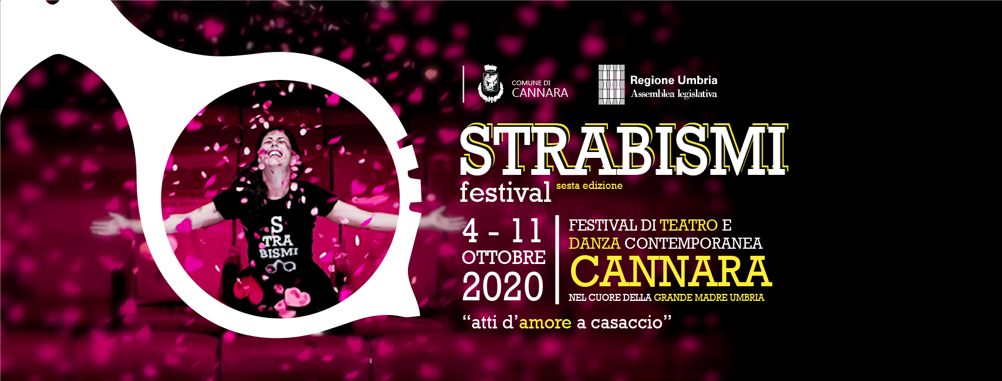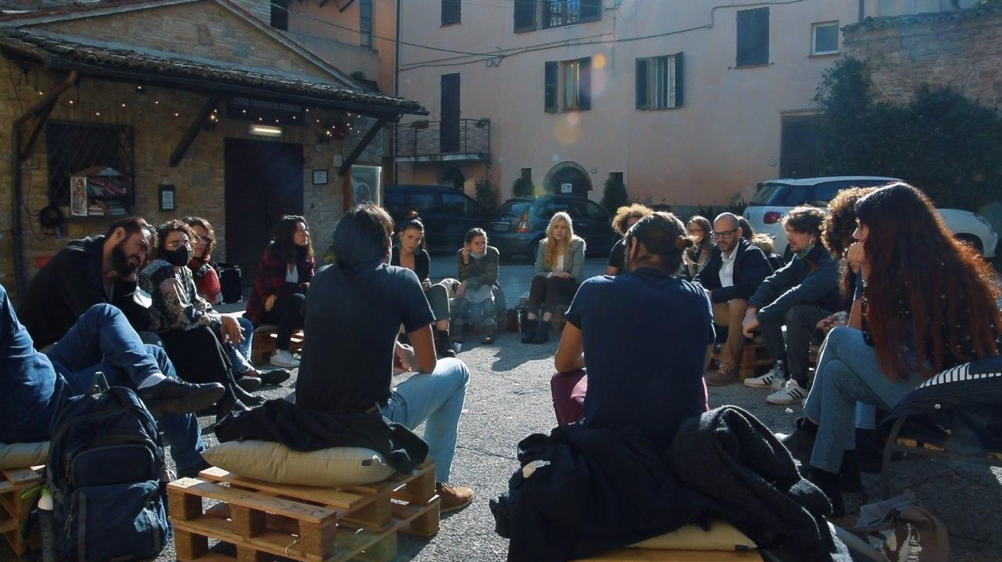Words by Giordana Patumi
Strabismi festival, Cannara, Perugia (Italy), 4-11 October 2020
What were you doing on Friday October the 9th? Maybe watching the Royal Ballet back on stage? Maybe having a drink (before 11pm due to Covid restrictions)? Well I was lucky to be in a teeny tiny village in the middle of the Italian peninsula called Cannara, where I was witnessing the VI edition of an independent theatre and dance festival called Strabismi.Â
This year the title was Atti d’amore a casaccio, literally ‘random acts of love’, as a wish for the independent, young theatre scene to find space in the national panorama post-pandemic. The programme this year was specifically dedicated to theatre and dance focused on territoriality and the support of Umbrian artists, with a careful look at the young makers.Â
I had the opportunity to talk with Alessandro Sesti, artistic director of the festival. The random acts of love they are trying to do is to dislocate the cultural processes, allowing art to invade places that too often are kept out of the official circuits and give to the public the theatre it deserves. What I understood is that the idea of Strabismiis to put the artists at the centre again; Alessandro says “I have the impression that by now there is only a lot of talk about numbers, competitions, prizes, awards and little about art itself.” The random acts of love could refer to the other with respect: it takes little, for example to answer an email with the same dignity and education whether it is an emerging company or an artist with a thirty-year career. It must be recognised that without the care of today, we will have no one to answer politely in the future. Yet the political and social landscape reminds us of this every day but we, as always, more blind among the blind, do nothing but look elsewhere. And he continues “So, let’s collaborate, more and more, let’s build cross seasons, let’s support artists together and let’s make them circulate in our areas, let’s make them known in our territories and let’s make our colleagues become strong points, cues. It is possible, I am sure.”
An interesting part of the festival is the project Esotropia (taking the name after the  form of strabismus in children to symbolise the idea of a pure and uncontaminated view). The project is a showcase dedicated to young talents that have the chance to show the results of their artistic research on stage at the Thesorieri Theater of Cannara. The wonderful idea behind it is that, supporting the artistic choices, there was a group called Dodici/Decimi; young local spectators that are guided by the festival coordinators in a discovery and insight in what is theatre and artistic direction. “Our goal, says Alessandro, “is to create a young artistic direction within the Festival: as a first attempt, they have chosen a show among the six selected, but from next year we want to increase more and more, until Esotropia becomes a section entirely decided by the Dodici/Decimi group. Surely me and Silvio Impegnoso (from this year the Festival’s artistic co-director) will always be present as shores and stimuli to the critical spirit, but we want Strabismi to be their son too. I would like to underline that it was not taken for granted such a numerous response and especially by such talented and interested young people in the art world of today.”
The lockdown made come back home, here in my city and my region and I found it fascinating to see how I am now discovering and reflecting about the local artistic panorama and the impact in the community. I talked about this aspect with Alessandro and I found out that the impact with the Cannara community has been pleasantly surprising. For the ones who don’t know, Cannara is a town on the Topino River in the valley of central Umbria, in the province of Perugia (my town) with only 3,880 people, so you can imagine the challenge of bringing contemporary dance and theatre here. Alessandro says: “If at the beginning we found resistance, in time I can say that we have returned a space to their rightful owners: the citizens. The organisation of many activities in addition to the season, the collaborations with the associations of the area and the schools have made the theatre a meeting place for everyone. If you need a place for a book presentation, we make ourselves available together with the theatre. After all, this is what the theatre is all about: meeting and human exchange.”
I had the pleasure to end my evening in Cannara, watching part of the Estropia section with the two performances of L’AVVOCATO DI MATTEOTTI by Alessandro Blasioli and MAREA by Irene Ferrara/Trio Tsaba.
I left with a warm heart seeing that outside this small theatre space there were young people laughing, dancing, listening to music and enjoying their time at theatre again.

Photo credits: Strabismi Festival.
